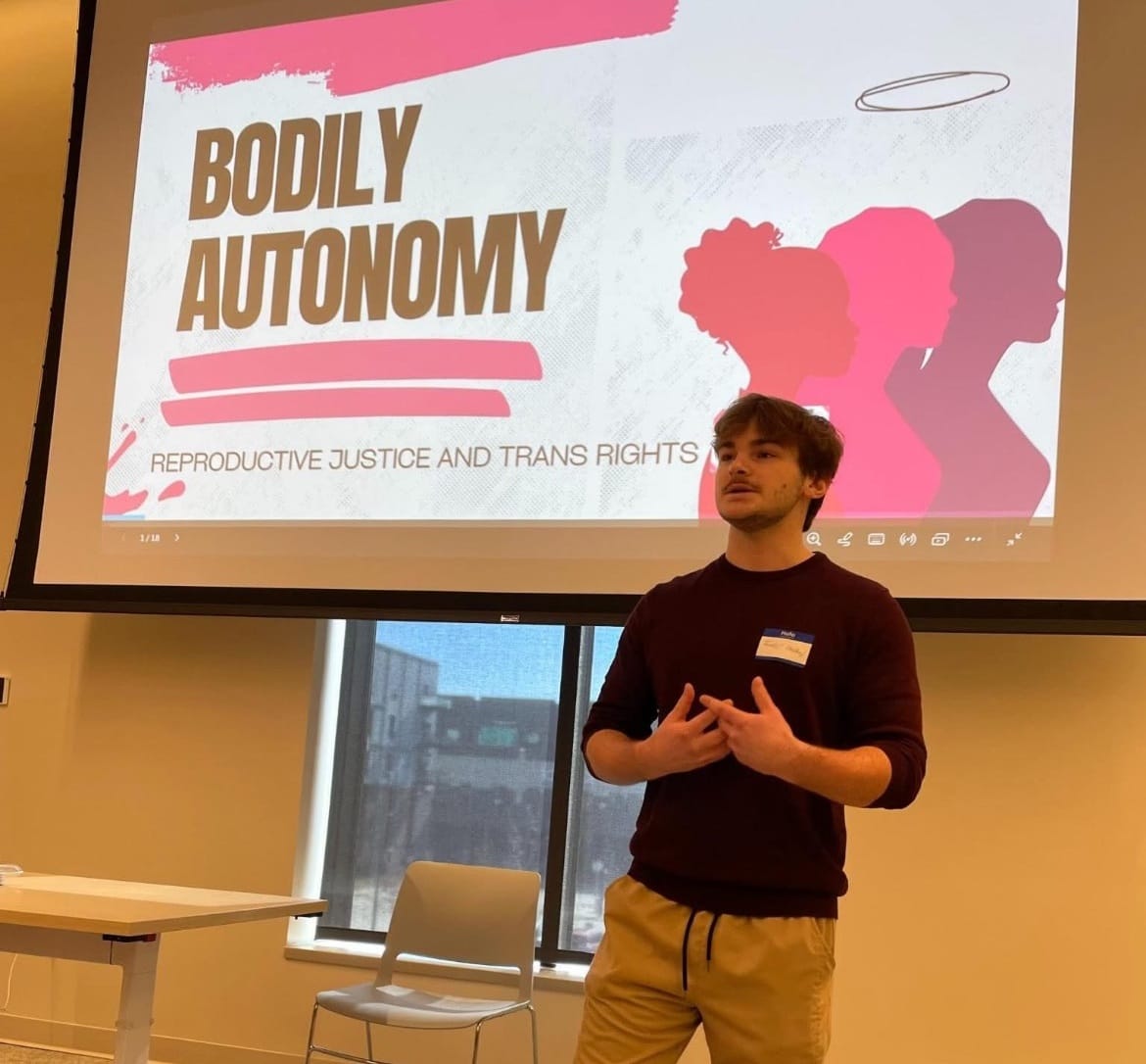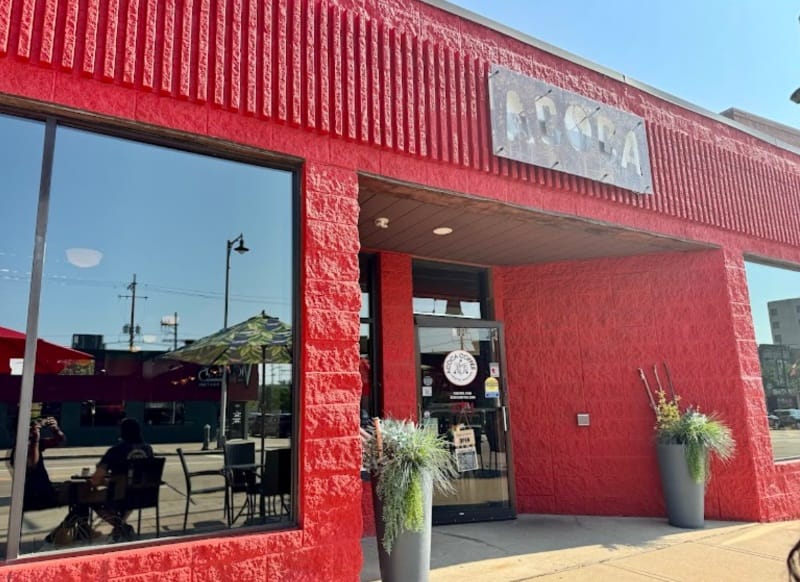Two years in, Hate Free Outagamie has become a tight-knit, fully focused group
HFO pays attention to national politics and recognizes what an existential threat the Trump administration in particular and GOP policy in general represents to the LGBTQ+ community. But their focus remains local and grassroots.
Spurs to action can spring from many sources.
It might be desperation. It might be something that strikes close to home. It often is frustration with the status quo.
In the case of Hate Free Outagamie, it was outrage. Specifically, it was disgust for a transphobic comment uttered by an Outagamie County Board Supervisor Tim Hermes two years ago that doesn’t bear repeating but was dripping with contempt for the trans community.
An amalgam of progressive groups around the area got together to push back against Hermes’ comments, urging that he be censured by the board. While that action was successful, the group, which formed into what is today Hate Free Outagamie, lost out in their efforts to defeat Hermes in that April’s election and he remains on the board.
“It was very grassroots,” says HFO co-chair Tanner Ziebell, who helped form the group with Mary Bogan when he was just 17 years old in 2023. “And when the censure worked it was just like, hey we don’t really feel like there’s any direct action organization in this area. We should stick together and build it out.”
Since then, Hate Free Outagamie has blossomed into a vibrant and active force against intolerance in all forms. It is primarily focused on LGBTQ+ advocacy but has immersed itself as well into the Gaza crisis, supporting in the strongest language the plight of the Palestinians against Israeli assaults following the Oct. 7 Hamas attacks.
“A large majority of our membership is queer so, yes, we focus on that,” he says. “But that doesn’t mean we don’t recognize how all of these issues are kind of interconnected. And understanding that queer oppression is linked to national oppression and economic oppression and the Palestinian struggle. It’s all interwoven so we definitely have a wide range of issues we fight for.”
Rowing in the same direction
While HFO might sound like a fairly loose melange of progressive groups that range from the more radical Lawrence University Students for a Democratic Society to those less focused on overhauling our political system and more on matters specific to marginalized groups, it is actually a fairly well structured organization. There are elected committees that are charged with everything from social media to outreach to events. There is an onboarding process for new members that usually involves a one-on-one meeting with Ziebell or Bogan.
And while the group understands that to be most effective, all members need to be rowing in the same direction, it welcomes diversity of opinion.
“There are disagreements and we encourage that,” Ziebell says. “And there is criticism within the group and we deal with that but most of the time, when we make a decision, it’s a majority decision because we are all very close in political opinion.
“We try to focus on how much we have in common.”
HFO pays attention to national politics and recognizes what an existential threat the Trump administration in particular and GOP policy in general represents to the LGBTQ+ community. But their focus remains local and grassroots. While Ziebell says the group recognizes the importance of electoral politics he and most of the HFO membership remains frustrated by what they see as a lack of sufficient protections from the Democratic Party.
“I don’t really see our political system reflecting the will of the majority of people in this country,” he says. “There are definitely some forms of corruption and lack of democracy on both sides.
“But,” he adds, “Republicans are a whole different grade of that.”
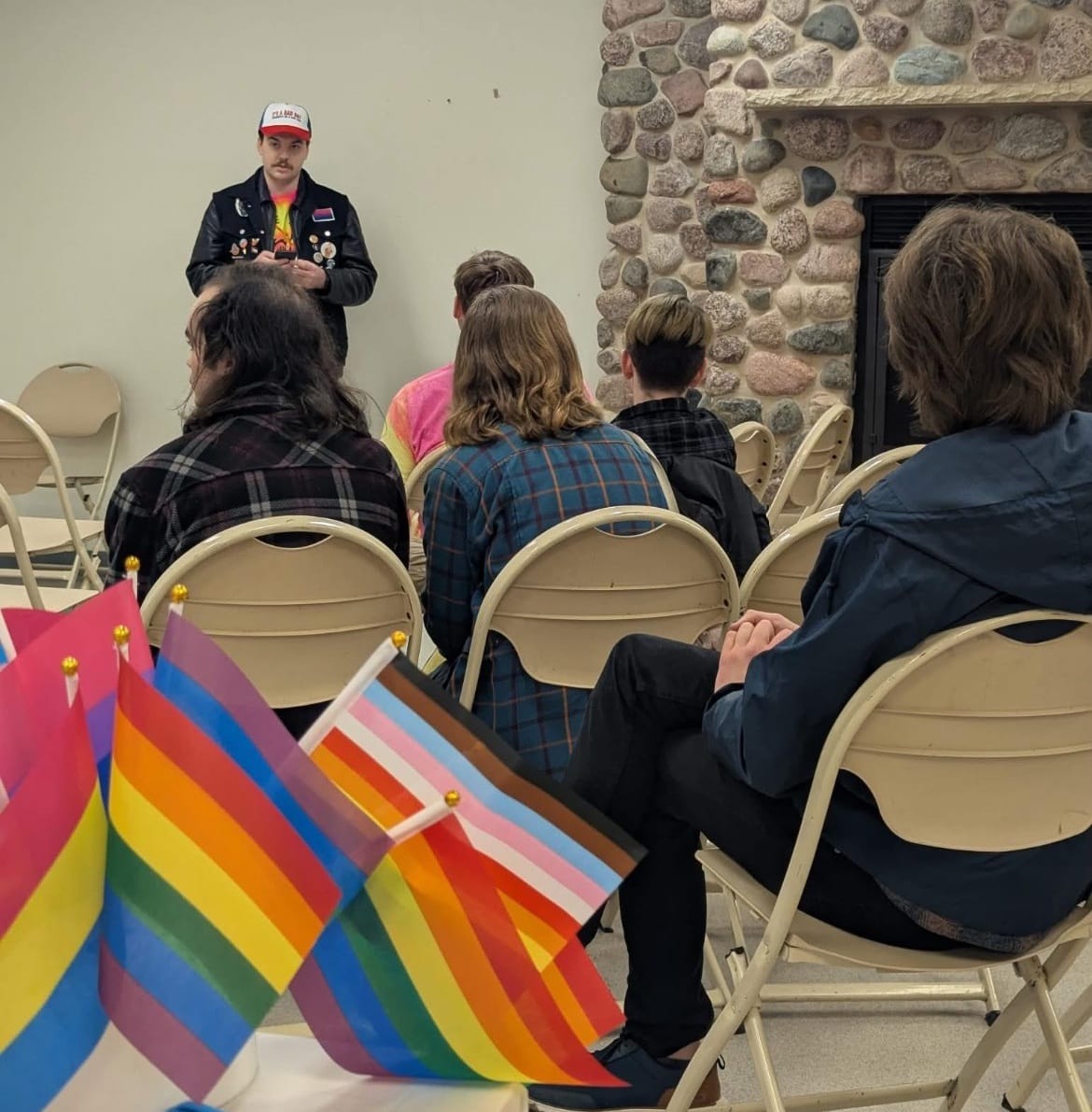
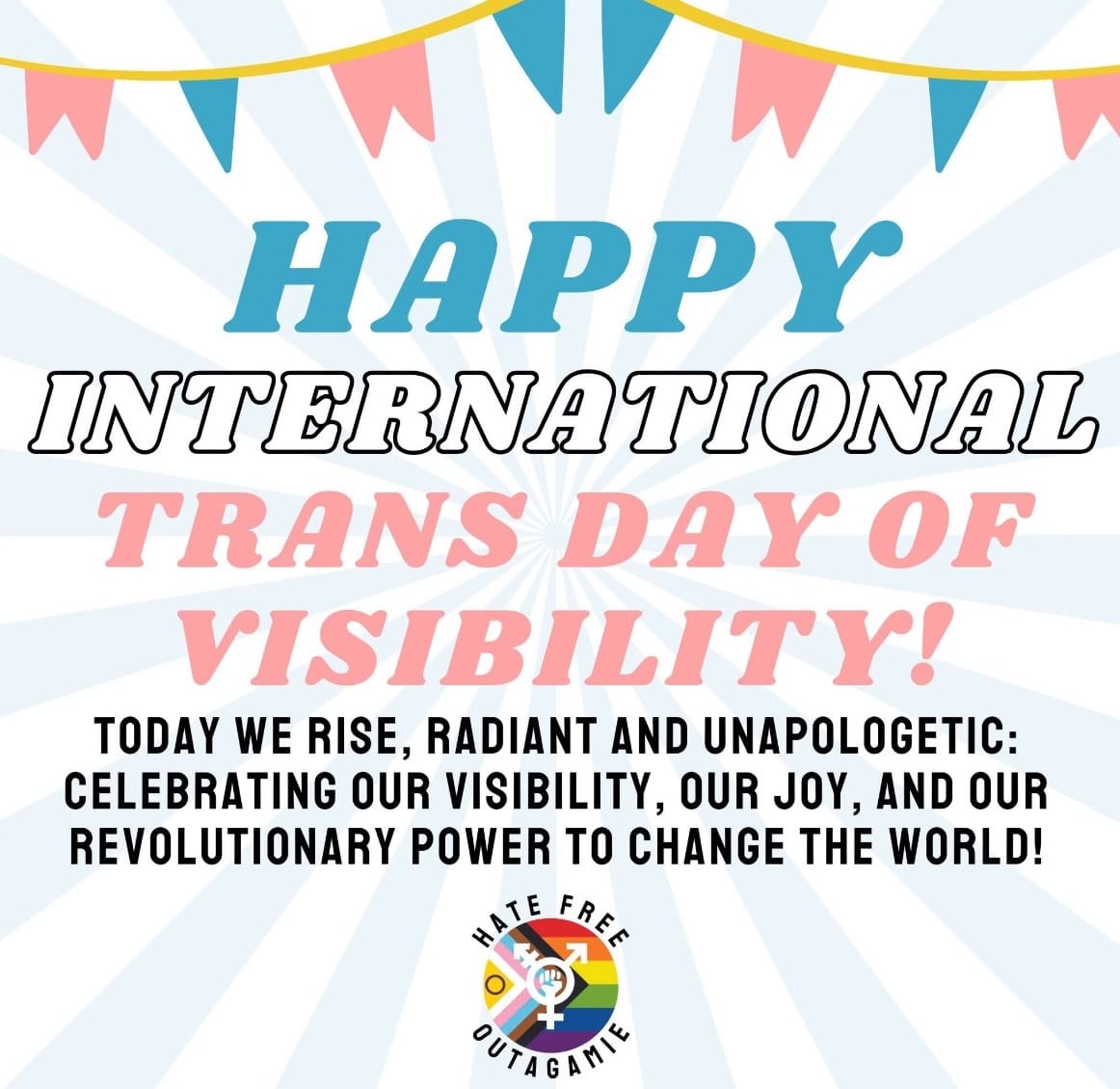
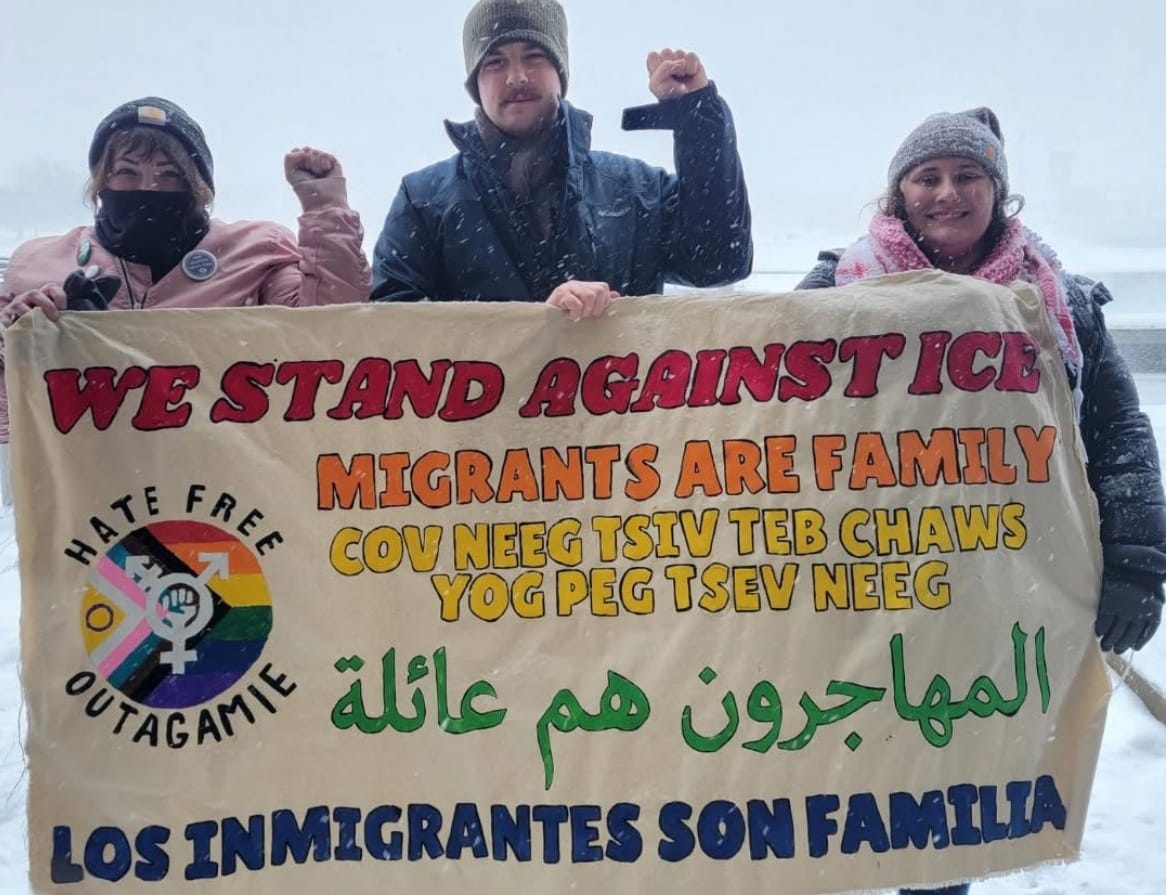
Left, a presenter at Trans Day of Visibility; Right, HFO holds up their banner supporting immagrants during a pro-Palestinian rally in Milwaukee. (Photos from Hate Free Outagamie)
HFO takes aim at injustice in all forms
Ziebel points to the Democrats decision to keep sending funds to Israel despite what they see as that country’s indiscriminate bombing and raids on Gaza that have killed tens of thousands of Palestinians. He says he recognizes that Trump represents an even greater threat to Gazans, especially after he essentially called for a US takeover of the Gaza Strip.
HFO traveled to Milwaukee in late March to mobilize with the Wisconsin Coalition for Justice in Palestine. They had a table offering free queer literature at the Block of Books that was hosted by The Book Store in Appleton. They attended a late-announced hearing at the state capital to testify against the GOP’s anti-trans bills (since passed but expected to be vetoed by Gov. Evers).
They have demonstrated against Trump's regressive and harsh immigration policies and in support of immigrants.
But much of HFO’s energy goes to education and advocacy on a local level. One of its goals – and its current campaign – is to turn Outagamie County into a sanctuary city for trans people.
“We also are pushing the county board for that and for enshrining gender-affirming care,” he says. “So we are definitely supporting elected officials that want to work with us. It just isn’t necessarily our primary goal to campaign for a certain person or anything like that.”
HFO recently joined Green Bay Anti-War to host the Trans Day of Visibility at Memorial Park in Neenah. The event recognized past trans activists and celebrated trans resistance and solidarity. For trans people feeling even more threatened today following the state legislature’s recent slew of anti-trans legislation and the Trump administration’s open hostility to trans people and their causes, such days provide a sense of connectedness and safety.
One member of the trans community, who preferred to remain anonymous, says that while they see the purpose Trans Day Visibility serves, it’s far from a panacea and even serves to emphasize the reality of the trans person’s world.
“Sometimes trans people can't be visible,” they posted. “Sometimes it isn't safe, and they have to hide who they are. Sometimes they have to hide from various social situations and public places. Sometimes they can't even hide in the bathroom.
“TDOV isn't a pleasant self-affirming ritual. It's just a synchronized demand that we be able to exist without hiding. We mark the day every year by burdening ourselves with the need to say ‘hey we're people too, we're here too’ because for the other 364 days of the year we are trying to survive in a world where hiding in one way or another is necessary for survival.”
'The ones who are engaged are extremely engaged'
Earlier last month on International Women’s Day, HFO held an event at the library that explored “the interwoven struggles of trans rights, class, labor and bodily autonomy,” emphasizing once again that the struggle for liberation for one group is a struggle for all groups.
Tanner Ziebell came from a tolerant and liberal, if apolitical, family which, he says, has been supportive of their son’s activism.
“They’re proud of what we’re trying to do here,” he says. “I even talked to my mom about it the other day about maybe joining up with us.”
Ziebel was part of the school classes impacted by the COVID 19 shutdowns. He watched from home as millions of Americans died due to what he called “Trump’s negligence.”
“It was such a big cultural event and I’m stuck at home for months and then I just started paying more attention to what was going on. I couldn’t vote at the time so, you know, I wanted to get out there. I wanted to do something.”
For Ziebell, who whose paid job is as a para pro at a local school, being so involved in HFO has been a gift, but not an easy one. He estimates he puts in 20-plus hours a week doing the work.
Ziebel says that while Trump’s policies have endangered the trans community, threats to the gay community seem relatively unchanged since he took office.
“I would maybe even say that because of Trump’s election I’m almost feeling more supported,” he says. “Just in terms of reaction to such heinous politics, more people who were maybe quiet about their support (for the LGBTQ+ community) have been much more active and so I’m feeling a little more hopeful about the things we can do.”
Like with every generation, Ziebel’s has been disparaged as being disengaged and cynical. And if it was, you could make a case it has good reason to be. But Ziebell doesn’t see it that way and he would know. He’s on the front lines of youth activism. He sees his generation not as tuned out but seeking direction. Groups like Hate Free Outagamie allow them to channel young people’s frustration into something organized and focused.
“I think the ones that are engaged are extremely engaged,” he says. “And most are on the progressive side, fighting for good things. I still think there is a lot of disengagement but the energy that’s there needs to be directed somewhere. People don’t necessarily know where to go with that energy.
“They’re upset and that’s why it’s so good to see these protests happening in Appleton because you can meet those people and funnel them into organizations so that they can really, really get involved and make a difference.”


